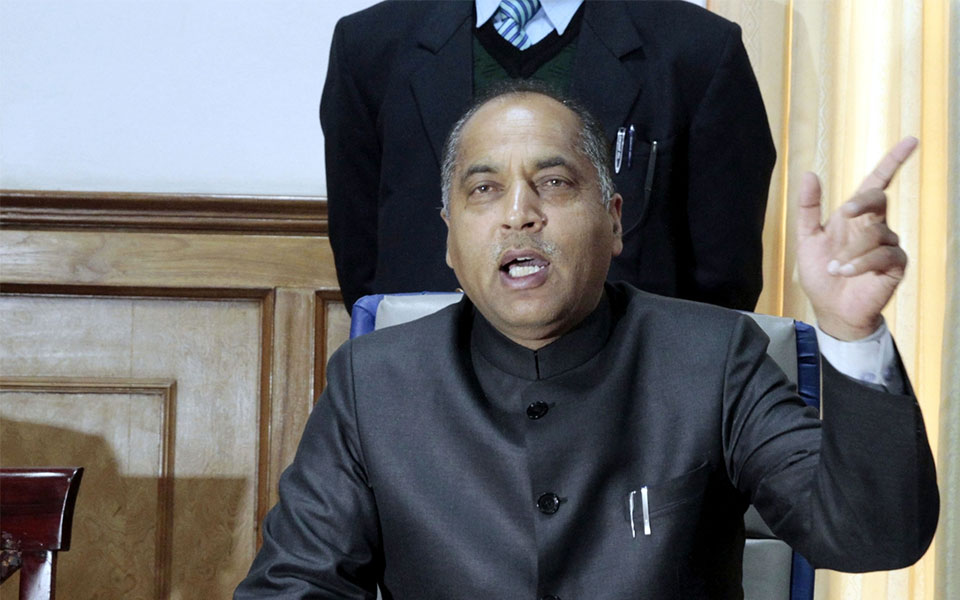Kullu, April 28: Himachal Pradesh Chief Minister Jai Ram Thakur in presence of Union Health Minister J.P. Nadda on Saturday launched several Central health schemes here for the state.
The schemes are Digital Nerve Centre, LaQshya Programme, Anemia Mukt Bharat, e-Compliance Programme and a mobile app of the Universal Health Protection Scheme.
He also laid foundation stone of a 100-bedded mother and child health wing of the regional hospital here to be constructed at a cost of Rs 20 crore, a state government spokesperson told IANS.
The state has received Rs 5 crore for the hospital as the first instalment from the central government.
The LaQshya Programme is an initiative to improve the quality of care in the labour rooms and operation theatres and other areas related to mother and child to reduce proportion of maternal and newborn deaths.
Anemia Mukt Bharat is a step towards making mothers and children anemia free, while the mobile app of Universal Health Protection Scheme aims at achieving universal health coverage and e-Compliance is an endeavour to check tuberculosis and ensure 100 per cent compliance of its treatment.
The Digital Nerve Centre was launched in association with TATA Trust for linking the patients with specialist doctors for world class treatment.
Transport and Forest Minister Govind Singh Thakur said the Union Government led by Prime Minister Narendra Modi was ensuring that the pace of development did not suffer due to want of funds.
Member of Parliament Ram Swaroop Sharma said the best coordination between the Chief Minister and the Union Health Minister had ensured that the state gets immense benefits from the Central schemes.
Let the Truth be known. If you read VB and like VB, please be a VB Supporter and Help us deliver the Truth to one and all.
Ottawa (PTI): Three Indian nationals have been arrested by Canadian police on an anti-extortion patrol and charged after bullets were fired at a home.
Harjot Singh (21), Taranveer Singh (19) and Dayajeet Singh Billing (21) face one count each of discharging a firearm, and all have been remanded in custody until Thursday, the Surrey Police Service (SPS) said in a statement on Monday.
The suspects were arrested by patrol officers after an early morning report of shots fired and a small fire outside a home in Surrey's Crescent Beach neighbourhood, the LakelandToday reported.
On February 1, 2026, the SPS members were patrolling in Surrey’s Crescent Beach neighbourhood when reports came in of shots being fired and a small fire outside a residence near Crescent Road and 132 Street.
The three accused were arrested by SPS officers a short time later, the statement said.
SPS’s Major Crime Section took over the investigation, and the three men have now been charged with Criminal Code offences, it said.
All three have been charged with one count each of discharging a firearm into a place contrary to section 244.2(1)(a) of the Criminal Code.
The investigation is ongoing, and additional charges may be forthcoming. All three have been remanded in custody until February 5, 2026.
The SPS has confirmed they are all foreign nationals and has engaged the Canada Border Services Agency, it said.
One of the suspects suffered injuries, including two black eyes, the media report said.
Surrey police Staff Sgt. Lindsey Houghton said on Monday that the suspect had refused to comply with instructions to get out of the ride-share vehicle and started to "actively resist."
"As we were trained, he was taken to the ground and safely handcuffed," said Houghton.
A second suspect with a black eye was also injured in the arrest after refusing to comply, Houghton said.
The arresting officers were part of Project Assurance, an initiative that patrols neighbourhoods that have been targeted by extortion violence.
Houghton said the Canada Border Services Agency (CBSA) is also involved because the men are foreign nationals, and the trio may face additional charges.
It's not clear if the men are in the country on tourist visas, a study permit, or a work permit, but Houghton said CBSA has started its own investigation into the men's status.
Surrey has seen a number of shootings at homes and businesses over the last several months, but there's been an escalation since the new year.





